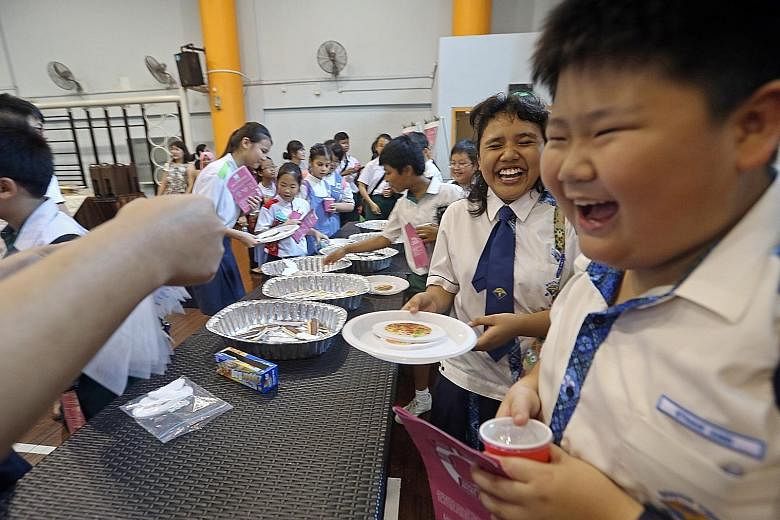Ten primary and secondary schools will be fitted with machines that guzzle food waste and turn it into compost by the end of next month, as the fight against food waste gets serious in the education sector.
Firing the first salvo is Chongzheng Primary School, which is part of the National Environment Agency's (NEA) two-year Love Your Food @ Schools Project, which was launched yesterday.
The school generates 17kg of food waste each day. The food-waste digester turns that into 2kg of compost within 10 hours.
From next week, the school's pupils, staff and canteen vendors will have to throw leftover food into four special bins. The waste will be weighed and dumped into the digester at the end of each day.
Said the school's principal, Ms Audrey Wong: "We want the children to understand the importance of recycling food waste and to help them to see in reality that food waste can become a resource such as fertiliser."
Yesterday, about 500 primary and secondary school students from over 30 schools were also guided through a food-waste educational trail set up at the school by NEA. At one of the five stations, for instance, students had to harvest artificial rice to find answers to questions on the length of time needed to grow different crops.
The trail also included a visit to the school's digester behind the canteen, where the students learnt how it works. They were given a cup of compost with soil to grow their own plants.
The compost the school produces each day will be given to residents who grow vegetables and fruit at community gardens in Tampines.
Commenting on the experience, Chongzheng Primary School pupil Daniel Ang, 11, said he would ask for smaller food portions when he is not feeling so hungry.
"I will also teach my parents and my friends not to buy or cook too much food," he said.
The 10 schools were chosen based on factors such as their level of participation in environmental programmes, and will be required to hold food wastage-reduction activities, such as assembly talks, for their students and staff.
Minister for the Environment and Water Resources Masagos Zulkifli said the NEA will assess the effectiveness of the project in getting schools to cut food waste.
"If that is successful, I hope more schools will adopt (food-waste digesters)," he said.
A school with a population of about 1,300 students and teachers produces about 30kg to 55kg of food waste a day.

